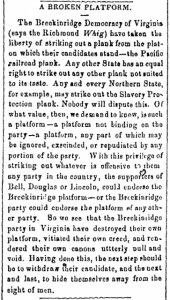 One hundred and fifty years ago today, the Charles Town, Virgina (there wasn’t a West Virginia yet)Free Press commented on reports that the state’s Breckinridge Democrats had abandoned a plank from their “national” party platform by repudiating support for the Pacific Railroad. This one little piece of fewer than 200 words illustrates how complicated the 1860 election was and how challenging it is for students to read nineteenth-century newspapers. The Free Press was a loyal southern rights Democratic paper run by the Gallaher family. They supported John Breckinridge, the nominee of the Southern Democrats and his new party’s attempts to cultivate western support through actions such as endorsing the Pacific (or transcontinental) Railroad and by anointing Senator Joseph Lane from Oregon as the party’s vice-presidential nominee. Yet the article, entitled “A Broken Platform,” reads like harsh criticism of the decision. “So we see,” reads the piece, “that the Breckinridge party in Virginia have destroyed their own platform, vitiated their own creed, and rendered their own canons null and void.” However, a careful reader will note that the piece begins with a parenthetical aside “(says the Richmond Whig)” referring to a leading paper in the state capital that supported John Bell and the Constitutional Union Party. Supporters of Breckinridge and Bell vied fiercely across southern states during the 1860 contest and by quoting from the Richmond Whig the Virginia Free Press was being sarcastic. Nineteenth-century readers understood the nuances (or so we imagine) but the finer differences and unique customs of partisan journalism are very difficult to explain to modern-day students.
One hundred and fifty years ago today, the Charles Town, Virgina (there wasn’t a West Virginia yet)Free Press commented on reports that the state’s Breckinridge Democrats had abandoned a plank from their “national” party platform by repudiating support for the Pacific Railroad. This one little piece of fewer than 200 words illustrates how complicated the 1860 election was and how challenging it is for students to read nineteenth-century newspapers. The Free Press was a loyal southern rights Democratic paper run by the Gallaher family. They supported John Breckinridge, the nominee of the Southern Democrats and his new party’s attempts to cultivate western support through actions such as endorsing the Pacific (or transcontinental) Railroad and by anointing Senator Joseph Lane from Oregon as the party’s vice-presidential nominee. Yet the article, entitled “A Broken Platform,” reads like harsh criticism of the decision. “So we see,” reads the piece, “that the Breckinridge party in Virginia have destroyed their own platform, vitiated their own creed, and rendered their own canons null and void.” However, a careful reader will note that the piece begins with a parenthetical aside “(says the Richmond Whig)” referring to a leading paper in the state capital that supported John Bell and the Constitutional Union Party. Supporters of Breckinridge and Bell vied fiercely across southern states during the 1860 contest and by quoting from the Richmond Whig the Virginia Free Press was being sarcastic. Nineteenth-century readers understood the nuances (or so we imagine) but the finer differences and unique customs of partisan journalism are very difficult to explain to modern-day students.
30
Aug
10








Related Articles
No user responded in this post
Leave A Reply
Please Note: Comment moderation maybe active so there is no need to resubmit your comments